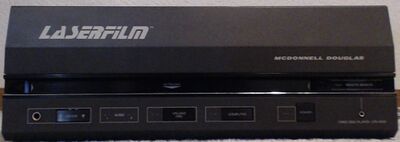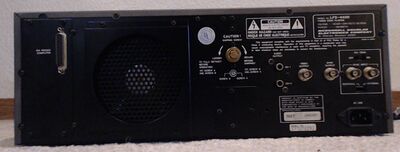McDonnell Douglas LFS-4400: Difference between revisions
Jump to navigation
Jump to search
No edit summary |
No edit summary |
||
| (2 intermediate revisions by the same user not shown) | |||
| Line 7: | Line 7: | ||
|modes=CAV | |modes=CAV | ||
|cx=No | |cx=No | ||
|inputvolts=120, 127, 220, 230, 240 | |||
|powerfreq=50, 60 | |||
|wattage=150 | |||
|frontimagefile=McDonnell Douglas LFS-4400 frontpanel.jpg | |||
|rearimagefile=McDonnell Douglas LFS-4400 rearpanel.jpg | |||
|compositeout=1 BNC | |||
|stereoout=1 RCA | |||
}} | }} | ||
==Other Information== | ==Other Information== | ||
[[LaserFilm|LaserFilm Videodisc]] playback only. McDonnell Douglas used multiple units running in unison for flight simulation.<ref>http://www.deadmedia.org/notes/15/155.html</ref> | |||
Latest revision as of 19:10, 24 January 2021
| Release Info | |
|---|---|
| Manufacturer | McDonnell Douglas |
| Release Date | 1986 |
| Country | US |
| Color Encoding System | NTSC |
| Features | |
| Playable Disc Formats | |
| Playable LaserDisc Modes | CAV |
| Both-Side Play | None |
| CX Noise Reduction | No |
| Video Characteristics | |
| Horizontal Resolution (TVL) | |
| Video Signal-to-Noise Ratio | |
| Laser Type | |
| Laser Wavelength | |
| Digital Video Processor | None |
| Analog Audio Characteristics | |
| Frequency Response | |
| Signal-to-Noise Ratio | |
| Digital Audio Characteristics | |
| Frequency Response | |
| Signal-to-Noise Ratio | |
| Power Characteristics | |
| Input Voltage | 120, 127, 220, 230, 240V |
| Power Frequency | 50, 60Hz |
| Power Consumption | 150W |
| Physical Characteristics | |
| Dimensions (W x H x D) | |
| Weight | |
| Loading Belt Part No. | |
| Accessories | |
| Remote Control | |
Clone Model Numbers/Rebadges
Manuals
Technical Data References
Other Information
LaserFilm Videodisc playback only. McDonnell Douglas used multiple units running in unison for flight simulation.[1]











